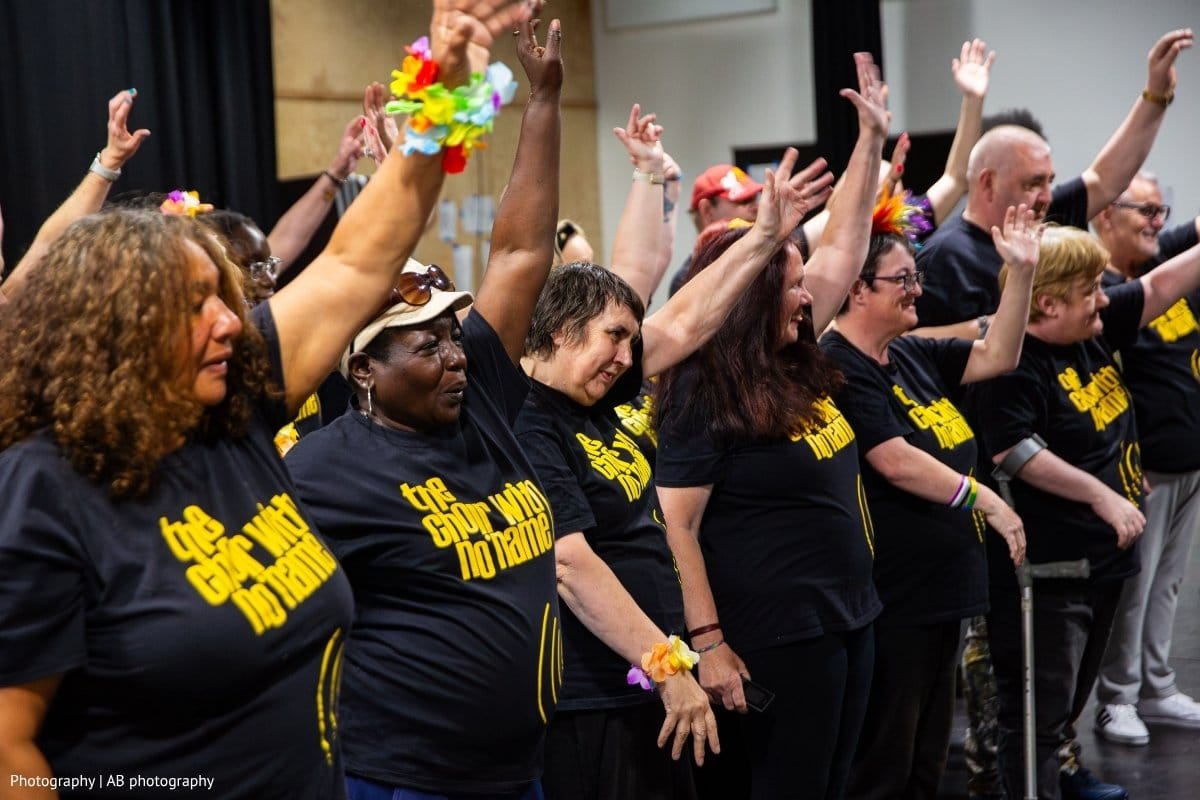We’re putting community initiatives in the spotlight, and today, we’re highlighting the national choir striking a chord with those experiencing homelessness
When Marie Benton first moved to London in 2008, joining a choir helped her find her feet. Working as a senior project worker at homeless accommodation provider St Mungo’s at the time, she had the dream of starting a choir to provide comfort and confidence-building to those going through a tough time. Inspired, she hung posters in local hostels advertising a ‘choir with no name (yet)’ – and it hit the right note. The Choir with No Name (CWNN) was officially born.
The organisation now boasts seven choirs across multiple cities – including Birmingham, Cardiff, and Liverpool – providing singing communities for people impacted by homelessness and marginalisation.
The link between homelessness and mental illness has been widely documented. Sadly, the 2022 Unhealthy State of Homelessness report revealed that people going through homelessness experience worse physical and mental health than the general population, and that 45% report self-medicating with drugs or alcohol.
Clearly, the challenges facing people experiencing homelessness extend beyond finding shelter. But research published in Psychology of Music, back in 2012, found that those experiencing chronic mental health problems, physical disabilities, and intellectual disabilities, who joined a choir reported more positive emotions, better emotional regulation, and improvements in self-perception, social functioning, and even employment capacity following their participation.
CWNN has even conducted its own research, and according to its most recent annual member survey, 88% saw mental health improvements and 78% reported reduced stress and anxiety.
But getting people through the door can be a struggle, with people experiencing homelessness among some of the most isolated in our communities. “Frequently excluded and often ignored, our choirs aim to be the opposite of that experience, where everyone is seen and heard, and where they can leave their troubles at the door and have fun!” says CWNN’s chief executive Dr Kate Wareham.

Unlike other singing groups, there’s no fee to join in the CWNN, and no need to register beforehand, take part in an audition, or commit to showing up on a regular basis. All rehearsals start with a cuppa and a chat, where new members are greeted at the door, and shown the ropes by other members and a choir manager. Then, everyone sings together for 90 minutes, and enjoys a hot meal at the end of rehearsal.
“Many members have experienced trauma, and struggle with low self-esteem, difficulty with social interactions, and lack of trust in institutions,” explains Dr Wareham, “so we work hard to ensure that rehearsals are welcoming, trauma-informed spaces, where everyone has a place where they feel safe.”
The inclusive nature of the CWNN is clear – it welcomes adults of all ages, genders, sexualities, ethnicities, religions, and musical abilities. Members who take part often have experience of mental and physical health challenges, addictions, or physical and learning disabilities, while some singers may be survivors of domestic violence, have experience of being in care or prison systems, or be asylum seekers and refugees.
Not only is everyone welcome, but they also benefit from support that they may not find elsewhere. “Our choir directors are experts in teaching group singing in a way that ensures everyone, regardless of whether they think they can sing or not, is supported to flourish, both personally and musically,” says Dr Wareham. “They will work with those who are less confident or experienced to help them find their voice, encouraging good singing practice, and even encourage them to take the leap and sing a solo.”
Dan, who has been singing in the Liverpool choir since 2015, says his life has been transformed. In the early days, he was living in a hostel after being evicted from his family home. “At that point, I had retracted inside myself, wrapping myself in bubble wrap as a way of guarding against the world,” he explains.
But weekly choir rehearsals offered a routine among the chaos, which provided hope during dark times. “If my life was a ladder, at the time I joined choir I was on the very bottom rung, [...] so coming to choir was the start of me climbing up that ladder, and, slowly but surely, I got to where I am today – a confident, outgoing, silly person!”
Now, Dan has his own flat, is beginning to rebuild family relationships, and enjoys the thrill of performing solo on stage at the many CWNN performances that take place throughout the year.
As Dr Wareham reminds us: “At our choirs, it is as much about giving it a go as it is hitting all the notes, so everyone has the opportunity to shine and show the world their talents. You never know, you might even surprise yourself!”


Comments